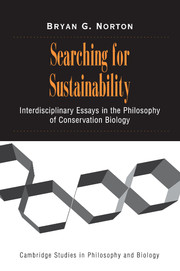Book contents
- Frontmatter
- Contents
- Searching for Sustainability
- General Introduction: An Interdisciplinary Experiment
- I PRAGMATISM AS AN ENVIRONMENTAL PHILOSOPHY
- II SCIENCE, POLICY, AND POLICY SCIENCE
- III ECONOMICS AND ENVIRONMENTAL SUSTAINABILITY
- IV SCALING SUSTAINABILITY: ECOLOGY AS IF HUMANS MATTERED
- V SOME ELEMENTS OF A PHILOSOPHY OF SUSTAINABLE LIVING
- VI VALUING SUSTAINABILITY: TOWARD A MORE COMPREHENSIVE APPROACH TO ENVIRONMENTAL EVALUATION
- 23 Commodity, Amenity, and Morality: The Limits of Quantification in Valuing Biodiversity
- 24 The Cultural Approach to Conservation Biology
- 25 Evaluation and Ecosystem Management: New Directions Needed?
- 26 What Do We Owe the Future? How Should We Decide?
- 27 Environmental Values and Adaptive Management, with Anne Steinemann
- Index
- References
25 - Evaluation and Ecosystem Management: New Directions Needed?
Published online by Cambridge University Press: 21 January 2010
- Frontmatter
- Contents
- Searching for Sustainability
- General Introduction: An Interdisciplinary Experiment
- I PRAGMATISM AS AN ENVIRONMENTAL PHILOSOPHY
- II SCIENCE, POLICY, AND POLICY SCIENCE
- III ECONOMICS AND ENVIRONMENTAL SUSTAINABILITY
- IV SCALING SUSTAINABILITY: ECOLOGY AS IF HUMANS MATTERED
- V SOME ELEMENTS OF A PHILOSOPHY OF SUSTAINABLE LIVING
- VI VALUING SUSTAINABILITY: TOWARD A MORE COMPREHENSIVE APPROACH TO ENVIRONMENTAL EVALUATION
- 23 Commodity, Amenity, and Morality: The Limits of Quantification in Valuing Biodiversity
- 24 The Cultural Approach to Conservation Biology
- 25 Evaluation and Ecosystem Management: New Directions Needed?
- 26 What Do We Owe the Future? How Should We Decide?
- 27 Environmental Values and Adaptive Management, with Anne Steinemann
- Index
- References
Summary
INTRODUCTION
There is a pervasive trend toward ecosystem management today, a trend which is evident in federal, state, and regional agency actions and in countless publications. This is an important and laudable development; the purpose of this paper, however, will be to show how this pervasive trend creates an important gap in our ability to evaluate environmental policies, and to suggest a general direction that may prove useful in filling this gap.
Environmental management has traditionally been atomistic in the sense that it has addressed particular problems with particular legislation, and in the sense that it has usually addressed problems of wildlife management on a species-by-species basis (Norton, 1991). Accordingly, the methods of valuation that have been developed, and with which managers have most experience, are almost all scaled at the level of particular populations or species, and are designed to measure specific and identifiable changes in one aspect of the environment. There have been, for example, studies of the recreational use values of game species; there have been hypotheses about the genetic value of particular species for pharmaceuticals and as breeding stock for crop species; and attempts to determine by questionnaires how much consumers are willing to pay to retain this or that population or species for non-use, or ‘existence’ value (see Freeman (1993) for a survey of these methods).
- Type
- Chapter
- Information
- Searching for SustainabilityInterdisciplinary Essays in the Philosophy of Conservation Biology, pp. 478 - 492Publisher: Cambridge University PressPrint publication year: 2002



